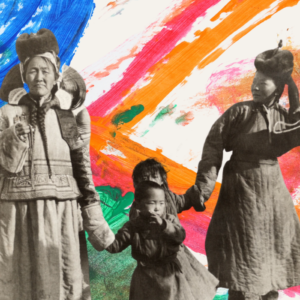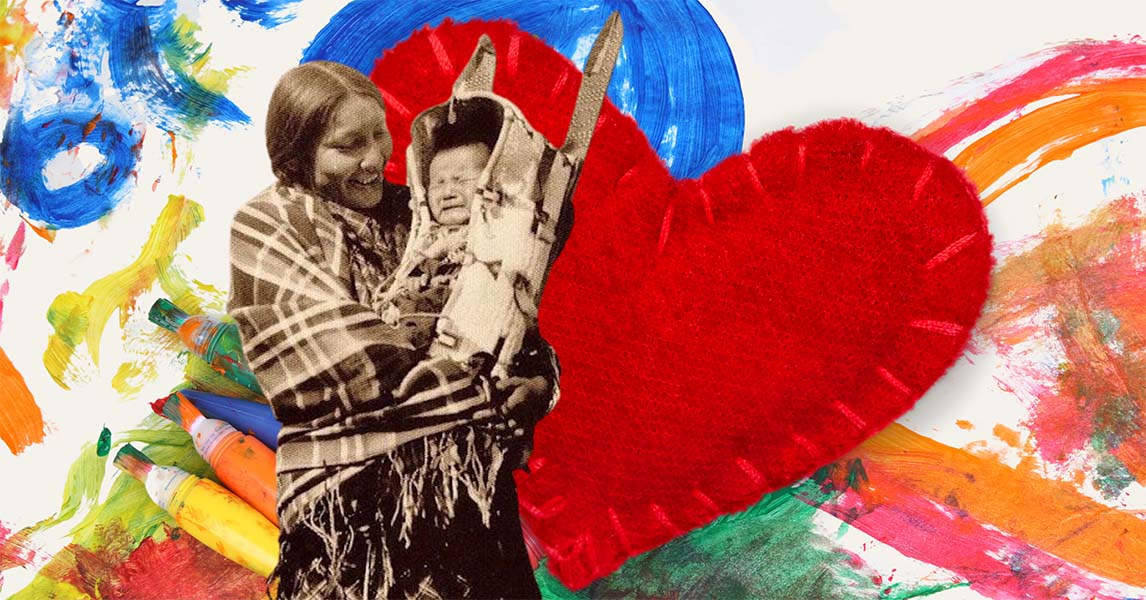I stood gleefully clutching my wallet and my shopping cart.
It was my first ever solo “adult” grocery trip. I had just moved out of my parent’s house and I intended to buy every single item my heart desired.
After years of eating the meals my parents planned and purchased I was finally at the helm of the decision making. Snack cakes? Yep. Artisanal bread? Uh-huh. Expensive cheese? Oh heck yes!
I filled that cart to the brim, blew my budget, and savored every single bite of freedom.
I was an adult!
Or so I thought.
Twenty plus years later, I still chuckle at the memory.
Over the next few years, there would be dozens of notable experiences that stretched a tightrope between my new freedom and the self-control of survival in the rocky landscape of my autonomous life.
As a young adult, I wondered who was in charge of me?
My parents seemed to think it was, at least partly, still them.
Friction happened. I struggled to establish my own sovereignty and found myself frequently ducking hard conversations with my Mom in order to save hurt feelings or avoid uncomfortable confrontations. I craved the right to make my own choices and felt equally overwhelmed by the choices themselves.
The connections we have with those who cared for us as children – regardless of if we grew up with biological parents, adoptive parents, caregivers or guardians – are full of big emotions.
Now, I find myself on the other side of this equation. Last fall, I dropped my first born off at college several states away. While I’d like to think he’s more prepared for rational grocery shopping than I was, the shift from driver’s seat to backseat in his decision making is still new and strange.
Guidance, thoughtfulness, and grace have helped us navigate these first few months together as my child and I face each other as adults. Here is what I’ve learned- from both sides of the fence:
How Culture Tells Us When To “Grow Up”
 When- and where- you grow up has a significant pull over the transition between child and adult.
When- and where- you grow up has a significant pull over the transition between child and adult.
Sociologists label the “emerging adult” period of the human lifespan as the period between 18 and 25 years of age. But in some cultures? The transition barely exists at all. In others it is prolonged well into the 30’s.
Contemporary families all have to grapple with changing relational dynamics as children become adults and take on new roles. And while some cultures have strong norms in place on how these relationships evolve – others fall short.
That leaves room for a lot of miscommunication, collateral damage, and unhealthy relationships that create long-term emotional and psychological challenges for families.
Take these cultural differences:
In the Middle East and North Africa, where family bonds are tight, it is culturally normal for adult children to live in a home with their parents- even after marriage and children.
In Hong Kong, the high cost of living is driving families to live within intergenerational homes as well. A full 76% of citizens between 18 and 35 still live with their parents.
In my own middle class, midwestern American home, I’ve found myself in the “sandwich” of being a mom. The first three of our nine children have graduated high school and transitioned out of our home- but I still have heavy parenting responsibilities with our other children. While parenting my own children, I also shoulder responsibility for my in-laws in their declining health.
Like many women, I grapple with how to best create a life that honors our individual and shifting family needs. While I run between campus, home, and aging parents I’ve can’t help but wonder if cultures in multigenerational compounds have a better support system.
Grown-Up Babies: “I DO IT MYSELF!”
 “I DO IT MYSELF” says the tiny voice who followed at my knees.
“I DO IT MYSELF” says the tiny voice who followed at my knees.
I loved the ferociously independent boy who was my toddler son of times gone past. He had such a big opinion, I had to respect so much moxy.
Now in that tubby toddler’s place stands a wiry, muscled 19 year old with facial hair and the deep timbre vocals of a man. The determination to chart his own course remains.
But on that first day in his new dorm, as I moved to drive back home, the man-child turned to me with tears glistening and chin quivering. My mom-heart broke! I nearly repacked his room and took him with me!
There is no time in a mom’s life more heart-wrenching and rife with worry than launching a child into adulthood. Whether into a college dorm, onto a military flight, or off onto another adventure – we hold our breath and hope we’ve done enough to help them fly.
The pitfalls are many. The consequences feel huge.
In the weeks since my son left for school, he’s reached out several times for assistance, reassurance, and support.
An earache in the middle of the night. A transcript that never arrived.
When he asks for help, it’s not easy to balance between support and control. The key to doing it right begins in early teenage years, allowing your children intentional situations to implement decision making and control.
Teenagers: Decision-Makers In Training
 As early as 13 or 14, I encouraged my children to make calls related to appointments or banking while I stood close by monitoring and answering any questions. I sent them into stores alone. I intervened in school matters only when absolutely necessary.
As early as 13 or 14, I encouraged my children to make calls related to appointments or banking while I stood close by monitoring and answering any questions. I sent them into stores alone. I intervened in school matters only when absolutely necessary.
“Adulting” training wheels, so to speak.
Encouraging this sort of self-directed behavior will help pave the way to riding the bike of life solo.
Even so, I admit: letting go can be so hard! Your children are developing self-confidence in paving their own path.
You?
Cheer from the sidelines.
You’ve equipped them with years of guidance and (hopefully) encouraged smart decision making. Now is the time to trust their capability will be enough to see them through to the finish line.
Or will be- in time.
Real (Young) Adults: Who’s the Boss?
 I remember the first time I realized I could say “No!” to my parents and actually mean it.
I remember the first time I realized I could say “No!” to my parents and actually mean it.
I’m almost embarrassed to admit I was 29 and the mom of four children.
I didn’t have a good relationship with either of my parents growing up. That’s ok, because it’s led me to forging new parameters for how I want to parent differently in my own home. My philosophy has all had this foundation:
Healthy relationships have solid parameters on what we are willing to do, say, lend, or give.
Learning how to set boundaries is the first step toward any good relationship. But setting those with your parents isn’t easy. In our culture, we’re taught either subconsciously or overtly that “adults”, especially parents, are infallible and deserve “respect”. Unfortunately, that respect often means acting as if the older generations within our family are above reproach.
This can be terribly difficult- especially as we ourselves learn more about the world, our family history, and begin to forge our independent identity.
That first overt challenge to parental authority isn’t easy.
The relationship with my parents as an early 20-something was complicated at best. I often felt compelled to ignore oversteps into my decision making or accept abusive commentary to avoid conflict. Setting a boundary meant I had to confront my fear of hurting them. And deeper still, I was scared of not being liked- or loved- by them if I said “no”.
The rule here is: there are no hard and fast rules. Honest communication is a good place to start- but it’s not so easy in practice.
How Can You Be Honest As The Mom?
 Now that we are past his initial shock of being dropped off three states away, my son’s calls are less frantic and forlorn. Thank goodness I don’t have to hide my breaking heart! Now, he calls with excitement and I feel fortunate to have such a great, open relationship with him.
Now that we are past his initial shock of being dropped off three states away, my son’s calls are less frantic and forlorn. Thank goodness I don’t have to hide my breaking heart! Now, he calls with excitement and I feel fortunate to have such a great, open relationship with him.
Communicating with adult kids can feel like a game of telephone. What we hear doesn’t always match the intention of the speaker. Does your daughter want to hear your reaction when she admits she’s stopped eating because she’s stressed about having the money to keep up with friends? Does your son want to risk disappointing you but admitting he got too drunk last weekend?
Making stupid decisions, pushing limits, and challenging previously held beliefs are part of becoming your own “adult”. And that always means doing something that you wish, in hindsight, you hadn’t.
When your son calls and tells you he misses you, it’s your job to adapt to your new role without slipping into “control mode”.
Something that helps? Good old fashioned active listening.
If your newly grown and flown kids are ducking your calls it could just be that they’re busy building new lives. Or it could be when they talk they don’t feel like you’re listening. Interrupting their stories to admonish them for what you feel are poor decisions is a fast pass to their voicemail.
Of course, sometimes we have good cause to be worried about their choices.
Be direct, understanding, and kind but know that ultimately it is no longer your place to punish or control. Yes, it’s scary when an adult you love is making choices that startle or frighten you.
But it’s worse to be worried and cut off from communication.
Remembering your own years of over-buying groceries, drinking too much, or dropping classes and changing majors every twelve seconds just might help you channel your inner empathy. You didn’t have it all figured out, either.
Every obstacle and mistake is an opportunity for growth and maturity.
If you’re in over your head it’s okay to call in an expert. A therapist who specializes in family relationships can help you untangle miscommunications and keep the lines of communication open.
How Can You Be Honest With Your Grown-Ass Mom?
 Find yourself smack between fledgling young adults making their own choices for the first time and mentally and/or physically declining parents?
Find yourself smack between fledgling young adults making their own choices for the first time and mentally and/or physically declining parents?
Welcome to the “sandwich” generation.
Just when you think you’ve gotten the hang of how to relate to your parents as an adult, everything changes. Renegotiating relationships yet again with aging parents is overwhelming.
My partner and I just found ourselves reversing roles with his parents. After years of relying on them to be the most “adult” of adults in the room, we are now stepping into new roles as their decision makers.
The key to smoothing out the bumps has been listening to their needs and respecting them as much as possible. Often that means my husband has to put aside his own feelings and make hard calls. Autonomy has become a flexible concept.
When mental agility declines, the right to make personal decisions gets sticky. It may be time to discuss a POA and assume banking and other financial responsibilities.
We are trying to decide if Dad needs to have specialized nursing care while also worrying about the post-grad choices of our third child. It’s both gratifying to be there for them all and exhausting emotionally.
The only thing that has saved me is intentional self-care.
Nurture yourself as you take the lead as the authoritative adult in your extended family. Think:
- What activities are a balm to your soul? Explore them further.
- Do you need a new hobby? Connect with local groups or clubs.
- Hire a therapist or life coach to give yourself somewhere to purge the stress.
- Get an emotional support animal (my lab has saved my sanity this year!)
Through the journey of life, your family are your closest traveling companions. The good news? Healthy, satisfying relationships are possible. Own what’s yours, give advice when asked, and prepare to jump in only when absolutely necessary.
It’s one heck of a ride, but it’s worth the price of admission.
Happy Parenting,
Creative Director




